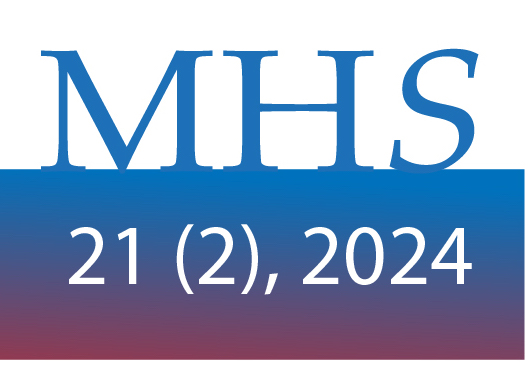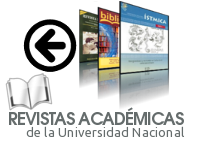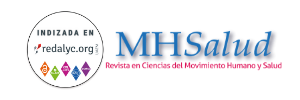Effect Of An Intervention With Motor Stories On Pre-Basic Students Honduras, San Pedro Sula
DOI:
https://doi.org/10.15359/mhs.21-2.19663Keywords:
Physical activity, Self-efficacy, Enjoyment, Childhood, SchoolchildrenAbstract
Introduction: The purpose of the study was to determine the effect of the intervention on motor stories in pre-school students in Honduras, San Pedro Sula. 29 boys and girls, ages 4 and 5, from the pre-basic educational level participated. Methodology: Validated pictorial instruments of enjoyment and self-efficacy towards physical activity were applied for boys and girls of these ages. Informed consent was collected virtually from parents or guardians and institutional permissions were requested to carry out the motor story intervention within the educational center. Results: The preschoolers who participated in the intervention with motor stories improved in their perception of enjoyment of physical activity, while the participants in the control group worsened. Regarding self-efficacy for physical activity, the percentage of change in this variable did not have statistically significant differences between EG and CG, with both groups showing a trend towards improvement post intervention. Conclusion: The present intervention showed positive results on the mediators of enjoyment and self-efficacy, using the ecological model as a central element.
References
Adamo, K.B., Wilson, S; Harvey, A., Grattan, K.P., Naylor, P.J., y Temple V.A. (2016). Does
intervening in childcare settings impact fundamental movement skill development? Med Sci Sports Exerc;48(5):926–32.
Álvarez, C.E.; Herrera-Monge, M.F.; Herrera-González, E.; Villalobos-Víquez, G. y Araya-Vargas, G.A. (2020). Sobrepeso, obesidad, niveles de actividad física y autoestima de la niñez centroamericana: un análisis comparativo entre países (Overweight, obesity, physical activity levels, and self-esteem in Central American children: comparative analysis between countries). Retos, 37, 238-246. https://doi.org/10.47197/retos.v37i37.71680
Álvarez Bogantes, C.; Herrera-Monge, M.; Herrera-González, E. y Araya-Vargas, G. (2021). Investigation of variables that determine levels of self-esteem in Central American schoolchildren: A binary logistic regression model. MHSalud: Revista en Ciencias del Movimiento Humano y Salud, 18(2), 1-12. https://doi.org/10.15359/mhs.18-2.2
Álvarez, C.; Villalobos, G.; Molina, K. y Vargas, L. (2022). Determinación de la auto-eficacia
y el disfrute hacia la actividad física de los infantes que asisten al nivel de transición de escuelas en el Valle Central en tiempos de pandemia. E-Motion: Revista de Educación, Motricidad e Investigación, (19), 28-44. https://doi.org/10.33776/remo.vi19.7126
Álvarez, C., y Zelaya, C. (2023). Percepción acerca de las barreras para realizar
actividad física en los recreos de los estudiantes de primaria de escuelas públicas de San Pedro Sula. Revista Retos (Manuscrito en proceso de publicación).
Arévalo, H.; Urina, M. y Santacruz, J. (2020). Impacto del aislamiento preventivo obligatorio en la actividad física diaria y en el peso de los niños durante la pandemia por SARS-CoV-2. Revista Colombiana de Cardiología, 27(6), 589- 596.
https://doi.org/10.1016/j.rccar.2020.09.003
Arroyo-Xochihua, O.; Mendoza-Soto, M.; Cuellar-Rufino, S.; Coutiño-Rodríguez, M. y Arroyo-Helguera, O. (2022). Efecto del confinamiento por COVID-19 en el estado mental y estilos de vida en niños y adolescentes: una revisión sistemática. Revista de Psicología y Ciencias del Comportamiento de la Unidad Académica de Ciencias Jurídicas y Sociales, 13(2), https://doi.org/104-116.10.29059/rpcc.20221201-153
Aznar-Cebamanos, M. y Gil-Espinosa, F. (2022). Barreras en la docencia de la educación física tras el regreso a las aulas después del confinamiento por la COVID 19. Revista técnico-científica del deporte escolar. Educación física y psicomotricidad, 8(3), 491-513. https://doi.org/10.17979/sportis.2022.8.3.9042
Bates, L. C., Zieff, G., Stanford, K., Moore, J. B., Kerr, Z. Y., Hanson, E. D., Barone Gibbs, B., Kline, C. E., & Stoner, L. (2020). COVID-19 impact on behaviors across the 24-hour day in children and adolescents: Physical activity, sedentary behavior, and sleep. Children (Basel, Switzerland), 7(9), 138. https://doi.org/10.3390/children7090138
Becker, B. J. (1988). Synthesizing standardized mean-change measures [Sintetizando medidas estandarizadas de cambio promedio]. British Journal of Mathematical and StatisticaI Psychology, 41, 257-278
Borenstein, M. (2009). Effect sizes for continuous data. En H. Cooper, L. V. Hedges, & J. C. Valentine [Eds.], The handbook of research synthesis and meta-analysis [El manual de síntesis de investigación y metaanálisis] (2 ed.). Russell Sage Foundation.
Briceño M., L. G. y Bermúdez, V. J. (2022). Obesidad infantil en la era de COVID: La epidemia dentro de la pandemia. Revista Latinoamericana de Hipertensión, 17(2), 176-184. doi:https://doi.org/10.5281/zenodo.6687128
Brown, H. E., Atkin, A. J., Panter, J., Wong, G., Chinapaw, M. J. M., & van Sluijs, E. M. F. (2016). Family-based interventions to increase physical activity in children: A systematic review, meta-analysis and realist synthesis. Obesity Reviews, 17(4), 345–360. https://doi.org/10.1111/obr.12362
Campuzano, D.; Guzmán, G. y Cisneros, J. (2022). Conductas de prevención del Covid-19 en niños preescolares en el regreso a clases presenciales. En M. D. Marín Soto, S. Gayosso Mexía, A. M. Carrizal Alonso y C. A. Muñoz Ibáñez (Comps.), Libro de Salud Mental de la Escuela Superior de Atotonilco de Tula, (2). (pp. 21-27). http://repository.uaeh.edu.mx/bitstream/bitstream/handle/123456789/20265/libro-salud-2da-edicion.pdf?sequence=1&isAllowed=y#page=22
Carraro, A., Young, M. C., & Robazza, C. (2008). A contribution to the validation of the Physical Activity Enjoyment Scale in an Italian sample. Social Behavior and Personality: An International Journal, 36(7), 911-918. https://doi.org/10.2224/sbp.2008.36.7.911
Cifuentes-Faura, J. (2020). Consecuencias del cierre de escuelas por el Covid-19 en las desigualdades educativas. Revista Internacional de Educación para la Justicia Social, 9(3), 1-12. Recuperado de https://revistas.uam.es/riejs/article/view/12216
Cliff, D. P., Okely, A. D., Smith, L. M., & McKeen, K. (2009). Relationships between fundamental movement skills and objectively measured physical activity in preschool children. Pediatric Exercise Science, 21(4), 436–449. https://doi.org/10.1123/pes.21.4.436
Cohen, J. (1988). Statistical power analysis for the behavioral sciences [Análisis de potencia estadística para las ciencias conductuales]. Routledge. http//doi:10.4324/9780203771587
Colella, D., Morano, M., Bortoli, L., & Robazza, C. (2008). A physical self-efficacy scale for children. Social Behavior and Personality: An International Journal, 36(6), 841–848. https://doi.org/10.2224/sbp.2008.36.6.841
Contreras, C.P.; Pérez Piñón, M. T.; Picazo, D. y Pérez Piñón, D. (2022). En tiempos de pandemia: de la educación presencial al entorno virtual y de regreso. Ciencia Latina Revista Científica Multidisciplinar, 6(1), 1821-1834. https://doi.org/10.37811/cl_rcm.v6i1.1612
Cooper, H., Hedges, L. V., & Valentine, J. C. [Eds.] (2009). The handbook of research synthesis and meta-analysis [El manual de síntesis de investigación y metaanálisis] (2 ed.). Russell Sage Foundation.
Dishman, R.K., Motl, R.W., Sallis, J.F., Dunn, A.L., Birnbaum, A.S., Welk, GJ., …Jobe, J.B. (2005). Self-management strategies mediate the association of self-efficacy with physical activity among sixth and eighth grade adolescent girls. American Journal of Preventive Medicine, 29, 10-18.
Ellis, P. D. (2010). The essential guide to effect sizes. Statistical power, meta-analysis, and the interpretation of research results [La guía esencial para tamaños de efecto. Potencia estadística, metaanálisis y la interpretación de resultados de investigación]. Cambridge University Press.
Engels, E. S., & Freund, P. A. (2020). Effects of cooperative games on enjoyment in physical education-How to increase positive experiences in students?. PloS one, 15(12), e0243608. https://doi.org/10.1371/journal.pone.0243608
Erades, N. y Morales, A. (2020). Impacto psicológico del confinamiento por la COVID-19 en niños españoles: un estudio transversal. Revista de Psicología Clínica con Niños y Adolescentes, 7(3), 27-34. https://dialnet.unirioja.es/servlet/articulo?codigo=7649329
Eyre, E. L. J., Clark, C. C. T., Tallis, J., Hodson, D., Lowton-Smith, S., Nelson, C., Noon, M., & Duncan, M. J. (2020). The effects of combined movement and storytelling intervention on motor skills in South Asian and white children aged 5-6 years living in the United Kingdom. International journal of environmental research and public health, 17(10), 3391. https://doi.org/10.3390/ijerph17103391
Etchegaray-Armijo, K., Fuentealba-Urra, S. y Bustos-Arriagada, E. (2023). Factores de riesgo asociados al sobrepeso y obesidad en niños y adolescentes durante la pandemia por COVID-19 en Chile. Revista Chilena de Nutrición, 50(1), 56-65. https://dx.doi.org/10.4067/S0717-75182023000100056
García, W. (2019). Sedentarismo en niños y adolescentes: Factor de riesgo en aumento. RECIMUNDO. Revista Científica Mundo de la Investigación y el Conocimiento, 3(1), 1602-1624. doi: 10.26820/recimundo/3.(1).enero.2019.1602-1624
Ghorbani, S., Nouhpisheh, S., & Shakki, M. (2020). Gender differences in the relationship between perceived competence and physical activity in middle school students: Mediating role of enjoyment. International Journal of School Health, 7(2), 14-20. doi: 10.30476/intjsh.2020.85668.1056
Gibbons, R.D., Hedeker, D.R., & Davis, J.M. (1993). Estimation of effect size from a series of experiments involving paired comparisons [Estimación del tamaño del efecto de una serie de experimentos que incluyen comparaciones pareadas]. Journal of Educational Statistics, 18(3), 271-279.
Global Recess Alliance, Ramstetter, C. L., Baines, E., Brickman, C. W., Hyndman, B., Jarrett, O., London, R. A., Massey, W., McNamara, L., Murray, R., & Rhea, D. (2022). Recess in the 21st Century Post-COVID World. The Journal of school health, 92(10), 941–944. https://doi.org/10.1111/josh.13235
Hedges, L. V. (1981). Distribution theory for Glass´s estimator of effect size and related estimators [Teoría de distribución para el estimador de tamaño de efecto de Glass y estimadores relativos]. Journal of Educational Statistics, 6(2), 107-128.
Iglesia, J. (2008). Los cuentos motores como herramienta pedagógica para la educación infantil y primaria. ÍCONO 14, Revista de comunicación y tecnologías emergentes, 6(1), 1-15. https://www.redalyc.org/pdf/5525/552556592006.pdf
Jordá, Ó. (2020). Las secuelas de la pandemia de la Covid-19. Papeles de Economía Española (165), 162-169. https://dialnet.unirioja.es/servlet/articulo?codigo=7689683
Lizondo-Valencia, R., Silva, D., Arancibia, D., Cortés, F., y Muñoz-Marín, D. (2021). Pandemia y niñez: efectos en el desarrollo de niños y niñas por la pandemia Covid-19. Veritas & Research, 3(1), 16-25. http://revistas.pucesa.edu.ec/ojs/index.php?journal=VR&page=article&op=view&path%5B%5D=75
Lluna-Ruiz, V.; Alguacil, M. y González-Serrano, M. H. (2020). Análisis del disfrute con la educación física, la importancia de las clases y las intenciones de práctica en estudiantes de secundaria: comparativa por género y curso. Retos, 38, 719-726. https://doi.org/10.47197/retos.v38i38.76941
Lum, M., Wolfenden, L., Jones, J., Grady, A., Christian, H., Reilly, K., & Yoong, S. L. (2022). Interventions to Improve Child Physical Activity in the Early Childhood Education and Care Setting: An Umbrella Review. International journal of environmental research and public health, 19(4), 1963. https://doi.org/10.3390/ijerph19041963
Miranda, D., y Vásquez, S. (2020). Relación entre disfrute de la actividad física y el autoconcepto físico de los escolares [Tesis de pregrado]. Universidad Andrés Bello, Chile. http://repositorio.unab.cl/xmlui/bitstream/handle/ria/17817 /a131294_Miranda_B_Relacion_entre_disfrute_de_la_actividad_2020_Tesis.pdf?sequence=1&isAllowed=y
Morano, M., Bortoli, L., Ruiz, M. C., Vitali, F., & Robazza, C. (2019). Self-efficacy and enjoyment of physical activity in children: factorial validity of two pictorial scales. PeerJ, 7, e7402. https://doi.org/10.7717/peerj.7402
Morris, S. B. (2008). Estimating effect sizes from pretest-posttest-control group designs [Estimando los tamaños del efecto de los diseños de grupos de pretest-postest-control]. Organizational Research Methods, 11(2), 364-386. doi: 10.1177/1094428106291059. Epub 23 de Julio 2007
Neville, R. D., Lakes, K. D., Hopkins, W. G., Tarantino, G., Draper, C. E., Beck, R., & Madigan, S. (2022). Global Changes in Child and Adolescent Physical Activity During the COVID-19 Pandemic: A Systematic Review and Meta-analysis. JAMA pediatrics, 176(9), 886–894. https://doi.org/10.1001/jamapediatrics.2022.2313
Paricio del Castillo, R. y Pando Velasco, M. (2020). Salud mental infanto-juvenil y pandemia de Covid-19 en España: cuestiones y retos. Revista de psiquiatría infanto-juvenil, 37(2), 30-44. https://doi.org/10.31766/revpsij.v37n2a4
Pitangueira, J., Rodrigues, L., y Ribas, P. (2015). The effectiveness of intervention programs in the prevention and control of obesity in infants: a systematic review. Revista Nutrición Hospitalaria, 31, 1455-1464. https://doi.org/10.3305/nh.2015.31.4.7809
Ruiz, C., Lagos, N., Hess, F., Godoy, C., y Gómez, N. (2023). Efectos de programas de ejercicio físico basados en un entorno escolar para mejorar el disfrute de la actividad física, desarrollo motor y condición física en niños y adolescentes con trastorno del desarrollo de la coordinación. Retos: nuevas tendencias en educación física, deporte y recreación, 47, 302-310. https://dialnet.unirioja.es/servlet/articulo?codigo=8626539
Scanlan, T.K., y Simons, J. (1992). The construct of sport enjoyment. In G. C. Roberts (Ed), Motivation in sport and exercise (199-215). Human Kinetics.
Sousa, G. C. de; Lopes, C. S. D.; Miranda, M. C.; Silva, V. A. A. da y Guimarães, P. R. (2020). A pandemia de COVID-19 e suas repercussões na epidemia da obesidade de crianças e adolescentes [La pandemia del COVID-19 y sus repercusiones en la epidemia de la obesidad de niños y adolescentes]. Revista Eletrônica Acervo Saúde, 12(12), e4743. https://doi.org/10.25248/reas.e4743.2020
Thomas, J. R., Nelson, J. K., & Silverman, S. J. (2015). Research methods in physical activity [Métodos de investigación en actividad física] (7 ed.). Human Kinetics.
Trost, S., Loprinzi, P., Moore R. &, Pfeiffer, K. (2011). Comparison of accelerometer cut points for predicting activity intensity in youth. Medicine and Science in Sports and Exercise, 43(7), 1360–1368. https://doi.org/10.1249/M SS.0b013e318206476e
Van Capelle, A., Broderick, C. R., van Doorn, N., E.Ward, R., & Parmenter, B. J. (2017). Interventions to improve fundamental motor skills in pre-school aged children: A systematic review and meta-analysis. Journal of Science and Medicine in Sport, 20(7), 658-666. https://doi.org/10.1016/j.jsams.2016.11.008
Villalobos, G.; Álvarez, C.; Araya, G. y Ambulo, G. (2022). Efecto de la intervención "escuelas activas móviles" en tiempos de pandemia sobre la percepción de la autoeficacia, disfrute y el nivel de actividad física en la niñez costarricense y panameña. MHSalud: Revista en Ciencias del Movimiento Humano y Salud, 19(2), 1-19. https://doi.org/10.15359/mhs.19-2.12
Wick, K., Leeger-Aschmann, C. S., Monn, N. D., Radtke, T., Ott, L. V., Rebholz, C. E., Cruz, S., Gerber, N., Schmutz, E. A., Puder, J. J., Munsch, S., Kakebeeke, T. H., Jenni, O. G., Granacher, U., & Kriemler, S. (2017). Interventions to promote fundamental movement skills in childcare and kindergarten: A systematic review and meta-analysis. Sports Medicine, 47(10), 2045–2068. https://doi.org/10.1007/s40279-017-0723-1
Downloads
Published
How to Cite
Issue
Section
License
Copyright (c) 2024 MHSalud: Revista en Ciencias del Movimiento Humano y Salud

This work is licensed under a Creative Commons Attribution-NonCommercial-NoDerivatives 3.0 Unported License.
General conditions
MHSalud: Journal in Human Movement Sciences and Health by the Universidad Nacional is cover under a Creative Commons Atribución-NoComercial-SinDerivadas 3.0 Costa Rica license.
The journal is hosted in open access repositories such as the Institutional Repository of the Universidad Nacional, the Kimuk Repository of Costa Rica and La Referencia.
The editorial source of the journal must be recognized. Use the doi identifier for this purpose.
Self-archiving policy: The journal allows the self-archiving of the articles in their peer-reviewed version, edited and approved by the Editorial Board of the Journal to be available in Open Access through the Internet. More information in the following link: https://v2.sherpa.ac.uk/id/publication/25815



















